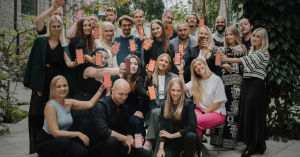Only have 1 minute? Here are 3 takeaways from the piece:
- Mario Peshev, entrepreneur, business advisor, and founder and CEO of DevriX, has taken on a new role as the CEO of Rush.app, a leading Shopify and Shopify Plus order tracking app, marking a significant development in the company’s journey.
- The Recursive did an interview with Peshev and he emphasized the potential of Eastern Europe as a burgeoning hub for tech innovation, and highlighted the importance of user-centric design in the rapidly evolving e-commerce industry.
- Discussing e-commerce trends, Peshev said, “International shopping is becoming more prevalent.”
When you think of a tech entrepreneur who has built multiple seven-figure businesses, advised over 400 companies, and now leads two companies simultaneously, you might imagine someone in Silicon Valley. But Bulgarian Mario Peshev, the new CEO of Rush.app, is breaking the mold right here in Eastern Europe.
Rush.app is not your typical e-commerce solution. Born in Bulgaria, it’s a shipment tracking software that’s helping businesses handle their logistics. In less than seven months after raising a pre-seed investment, Rush secured a €2.5M seed round co-led by Eleven Ventures and LAUNCHub Ventures and now services over 2,700 Shopify stores. The company was founded in 2019 by Kiril Kirilov, who has a background in the e-commerce industry, and Stanislav Stankov, who has experience in product management.
Enter Mario Peshev, a seasoned entrepreneur with a track record of scaling businesses. His appointment as CEO of Rush comes at a pivotal moment. With his experience as the founder and CEO of DevriX, a company specializing in WordPress development, Peshev is expected to apply his leadership skills and industry insights to guide Rush’s future. Rush’s new CEO is also an angel investor. He has supported startups such as Karavani BG and Vevol Media. Additionally, some companies he has invested in through SeedBlink – the leading European tech-powered investing platform – include Ambr, Alcatraz AI, and Codewell AI.
We recently had a chat with Peshev, picking his brain about his journey, his plans for Rush, and his take on the e-commerce industry.
During our conversation, Peshev gave a shout-out to The Recursive, other media outlets, strategic partners, investors, and the Rush team. He was quick to point out that it’s been a team effort to get Rush where it is today – check out the interview to get the full story.
The Recursive: Can you share a bit about the transition from business advisor to CEO of Rush.app? At what stage of development is the company currently, and what led to the decision to hire an external CEO?
Mario Peshev: Rush.app is a robust addition to over 2,700 Shopify stores originally started 4 years ago.
The geoeconomic fragmentation of the 2020s – between the pandemic, constrained travel, and uncertain market conditions – changed the landscape of the current growth trajectory. Store owners handle shipments differently, track new KPIs, manage fulfillment with different partners, and the audience is shifting. My work with Amazon sellers and e-commerce brands over the past years can be adapted and amplified using the proven Rush value proposition.
As the CEO of both DevriX and Rush.app, how do you manage your time and responsibilities between the two companies?
Mario Peshev: DevriX just turned 13 last month and the core leadership team has been handling the day-to-day for several years now. I’ve taken on fractional C-level roles in several fast-growing startups and understand the principles of ROI as a guiding light.
The startup realm is about hitting milestones and achieving objectives. It’s about prioritizing asymmetric opportunities and tackling high-value initiatives. This often comes in the form of late night calls or weekend events, for instance.
We can pinpoint many successful entrepreneurs in charge of multiple businesses (besides Musk, plenty of ex-founders now run funds, holding cos, angel syndicates, manage several brands). It’s easier – and more valuable – when brands complement each other, using the same marketing channels or cross-selling, and thus leveraging resources for higher efficiency.
What are some of the key factors you believe contribute to a venture’s success?
Mario Peshev: Product-market fit is key. This entails the need itself, the right solution, packaged appropriately (usability), priced accurately, defining a blue ocean market segment and a unique value proposition that scales.
Great core team is the foundational piece here. It’s common for teams to pivot and restructure businesses on the go. Working with the right leadership team – dedicated, committed, experienced founders and key players – can go a long way.
Can you share some insights into the process of launching new features at Rush.app?
Mario Peshev: The product team releases new features and integrations with bi-weekly sprints, improving the core product further.
We are the only app in the space providing full support of Shopify’s OS2 experience – the ability to implement and adjust the tracking page with native Shopify blocks and connect with hundreds of other extensions seamlessly.
The core team is building a flexible notification system soon to be integrated with the leading email and SMS vendors on the market.
And our growing data set of tracking page upsells is turning into weekly revenue reports for our stores in the coming two months.
One of my goals is exposing the ongoing roadmap to both existing and future customers.
As an angel investor, which are your investments and what is your investment strategy?
Mario Peshev: My angel investing portfolio is diversified – between Bulgarian, European, and American startups; most in tech but some in the health, food, and camping spaces; some booming disruptive brands while others focus on niche markets.
What I assess in pitches are the founding team, a viable business model, and a reasonable total addressable market. I only back deals I’m personally excited about – either industries I understand well and can support individually or innovations in the health/food/athlete space toward humanity.
Bonus points for products/SaaS I use and tools supporting the ecosystems I’m heavily involved with. I backed a Shopify theme builder earlier this year and this would present additional growth and conversion opportunities to Rush.app users soon.
The e-commerce landscape is rapidly evolving. Based on your extensive experience, what are some trends you anticipate in the next few years, and how is Rush.app positioning itself to adapt to these trends?
Mario Peshev: The dropshipping ecosystem has grown steadily over the past year – and certain fragments are getting more sophisticated. Branded dropshippers are a key segment of Rush users – print on demand businesses, hand-crafted items (jewelry), essential oils – a mix of products manufactured overseas and a personal touch building on top.
We’ve recently introduced new integrations with branding partners and fulfillment centers, and announced our AI-driven estimated date of delivery solution providing smart estimates based on shipment location, internal logistics, packaging, and current delays due to holidays or international events. Being mindful of geopolitical events or shopping seasons increases customer satisfaction, reducing returns, and presents a stickier experience thanks to returning shoppers.
We also provide the ability to reveal the last-mile carrier. Consumers purchasing overseas are often worried about working with a local post office or have preferences to operate with DHL or other proven providers. This level of visibility improves the shopping process and enables custom delivery options on the ground.
International shopping is also becoming more prevalent. The pandemic led to an increase in online purchases across the entire globe. Our established brands open new stores in new locations and need a streamlined, localized experience – from extended carrier support to internationalization and translations. Our fleet of supported carriers exceeds 1,300 partners and we’ve extended our tracking page support to 111 different languages via automated translations and custom language packages.
What do you think – why is Bulgaria turning into a hotspot for developing e-commerce solutions?
Mario Peshev: If we zoom out a bit and look into the global map, it’s easy to realize that generational success and perseverance is integral to building a strong, coherent community in any given field of work. China is a leading manufacturer due to a renowned focus on production in the 1950s for several decades. It was a top 10 manufacturer in the 1980s and ranked first globally in 2011.
Investing, training, production, building facilities, marketing, relationships, government support and gradual business adoption turned the country into a go-to destination for production.
Bulgaria is much smaller and more fragmented, no doubt here.
But the first electronic digital computer was invented by John Atanassoff in the 1930s with Bulgarian origins. In the 1960s Bulgaria received a Japanese license for manufacturing computers. Pravets personal computers were born later, with microcomputers created as early as 1979.
Amazon’s very first order in 1995 came from Bulgaria – with cash folded in a floppy disk sent internationally, marking the start of an e-commerce empire.
The last 3 decades were the inception of private companies, joining the EU, first strides of entrepreneurship, creating a healthy startup ecosystem, several successful VC funds based here, and a growing number of startups growing internationally. Telerik’s incredible exit in 2014 for $262.5M was a serious shift in putting Bulgaria on the global map for investing and talent. The “Telerik Mafia”, following global examples similar to the “PayPal Mafia” of former employees launching their own massive ventures, facilitated the first Bulgarian unicorn – and unofficially followed by several more in the last two years.
This heritage, creative spirit, logical DNA, combined with efficient logistics across the EU and access to new capital and global know-how, plus the flat capital gain tax, make Bulgaria a great place to launch successful startups with limited risk and high gain opportunities.
Looking ahead, what are some of your goals for Rush.app and DevriX? How do you see these two ventures growing and evolving in the future?
Mario Peshev: Rush.app is currently focused on the growing Shopify ecosystem representing over 4 million stores. In addition to order tracking and notifications, our top brands report over $100,000 in additional annual revenue brought in thanks to upsells across several channels. We’ll amplify our value proposition of providing transparent and satisfying customer service while increasing average order value for brands.
DevriX has been consistently ranked as a top 20 WordPress consultancy globally, working with fast-paced startups, SMEs, Fortune 1000s, and some of the largest publishers on the planet. Coining the “WordPress Retainer” model back in 2015, the agency still handles martech work for our first retainer clients 8 years ago. Keeping that velocity and scaling with our clients, as well as serving the remaining market of Amazon sellers, affiliate clients, and digital publishers, is part of the ongoing journey.
Both startups work with high-ticket brands, high-traffic stores, and portfolio businesses and channel partners in the commerce space. We share common technology partners, work with agencies together, collaborate with media buying agencies, and focus on customer experience and ROI.
There are new emerging partnerships that amplify our value proposition for clients. Imagine Shopify stores diversifying their revenue through our Amazon marketing partners or Etsy/eBay integration partners we work with. Or a full-service consultancy for leading brands in key categories including paid ads solutions and conversion rate optimization bundling Rush for order upsells.
And further down the road, we can expose our modular infrastructure horizontally and target other platforms like WooCommerce, BigCommerce or Magento.
What are some of the biggest challenges you’ve faced in your entrepreneurial journey and how have you overcome them?
Mario Peshev: Stephen McCranie once said, “The master has failed more times than the beginner has even tried.” My entrepreneurial journey has gone through emergencies and outages, losing business and strategic people, getting payment gateways frozen, our products flagged and taken off market during reviews, competition trying to take over business or staff, clients going rogue, and everything in-between.
Resilience is a key trait of every founder – one that entrepreneurs should embrace and learn to use as fuel. I published a book around some of these challenges during my book signing tour in California back in 2019 as a friendly reminder to anyone taking this exciting journey.
In your opinion, what are the key elements that make an e-commerce platform successful in today’s market?
Mario Peshev: There are two paths to success: the creative, niche hacking, quick growth accelerated journey and the brand building exercise.
The first one is often picked by dropshippers finding a unique angle or niche to arbitrage product between different markets and audiences. Finding best sellers in China or viral TikTok videos of products not yet available in the Western market, and learning how to package, build effective funnels, and push effective paid campaigns to explode.
The second one is more akin to product development and growing a sustainable journey. Storytelling, a creative twist, and building a community. Working with influencers to amplify that story. Building channel partners – or even opening retail stores in different countries. The power of a brand should not be neglected – look at Apple or Coca Cola being unstoppable players in today’s age.
At the end of the day, it’s the consumers dictating the rules. If you capture their attention consistently, your commerce business will thrive.








